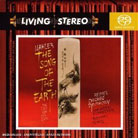December 2007
But what does one make of the documentation? Louis Biancolli’s original annotation is spread over six pages, followed by a two-page "History of Living Stereo." After this material, given only in English, comes John Newton’s "Technical Notes," first in English, then in German, then in French, accounting for another six pages; and then we have two pages devoted to a list of other releases in this series. What is not included, however, is what might be regarded as the most essential printed material with such a work: the sung text. That was included in the earlier CD package, and its omission here is simply outrageous. Collectors who like to have more than a single version may not mind, since they can follow along with the text from one of the other recordings -- such as the certifiably indispensable one on Decca, with the Vienna Philharmonic under Bruno Walter, Mahler’s close associate, who had presided over the work’s premiere. His incomparable soloists, in this second of his three recordings of Das Lied, were Kathleen Ferrier and Julius Patzak [289 466 576-2]. Reiner and his own excellent soloists (who distinguished themselves in numerous performances and several recordings of it) benefit from spacious stereophonic sound, and this handsomely remastered version calls for a warm recommendation for alternating with the monophonic Decca, but no more than any subsequent version can it be regarded as a replacement for it. GO BACK TO: |
 Mahler - Das Lied von
der Erde
Mahler - Das Lied von
der Erde